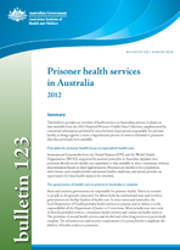Summary
This bulletin provides an overview of health services in Australian prisons. It draws on data available from the 2012 National Prisoner Health Data Collection, supplemented by contextual information provided by state/territory departments responsible for prisoner health, to bring together a more comprehensive picture of services delivered to prisoners than has previously been available.
Principles for prisoner health focus on equivalent health care
International frameworks from the United Nations (UN) and the World Health Organization (WHO), supported by national principles in Australia, stipulate that prisoners should receive health care equivalent to that available in their community, without discrimination based on their legal situation. Prisoners are known to be a population with chronic and complex health and mental health conditions, and prison provides an opportunity for these health issues to be reviewed.
The governance of health care in prisons in Australia is complex
State and territory governments are responsible for prisoner health. This is in contrast to people in the general community for whom both the national and state and territory governments are the key funders of health care. In some states and territories, the local Department of Health provides health services in prisons, and in others, it is the responsibility of the Department of Justice or Corrections. Most jurisdictions use a mix of directly provided services, community health services and contracted health services.
The provision of mental health services and alcohol and other drug services is particularly complex. The infrastructure and security requirements of a prison further complicate the delivery of health services to prisoners.
Health services delivered to prisoners are diverse
During a 2-week data collection period in 2012, it was found that 26% of male and 38% of female prisoners visited the prison health clinic. The most commonly managed problems were medication/vaccination, general health assessments, pathology, psychological/mental health, diabetes and drug and alcohol treatment.
Health services in prisons predominantly use a nurse-led care model, with a nurse being the health professional consulted in more than two-thirds of visits to the prison clinic. A doctor or medical practitioner was consulted in 1 in 5 visits.
Over half (55%) of female prisoners and about 4 in 10 male prisoners (37%) were taking prescribed medications during the data collection period.
A range of health services are delivered outside the prison
Sometimes prisoners are transferred out of the prison to access health services, such as radiology, surgical procedures or where specialist care is required. About half (49%) of prisoners who had been in prison for between 1 and 2 years, and were expecting to be released within the 4 weeks following data collection, had accessed health care in the community during their time in prison. These included visits to an emergency department of a hospital, as well as scheduled medical appointments.



